
 |
||||||
|
GAY
FILM REVIEWS BY MICHAEL D. KLEMM
|
||||||
|
Outrage Magnolia
Home Entertainment,
Director/Screenplay: With: Rated R, 94 minutes |
Washington
Confidential
"There's a right to privacy," states out Congressman Barney Frank, "but there's no right to hypocrisy." This is the theme of Outrage, a 2009 documentary by Kirby Dick (This Film Has Not Yet Been Rated), that examines the loathsome phenomenon of closeted politicians who live a secret gay life while, at the same time, abusing their power by spewing homophobic venom and voting against gay civil rights. |
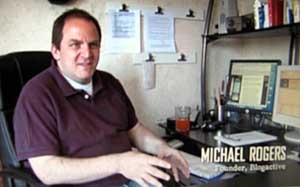 An
investigative report that mixes prominent talking heads with news footage
from various media, Outrage spills
the beans on a number of politicians known, or believed, to be closeted.
It also tells the stories of the crusading journalists and activists who
go after them. Acting almost as a master of ceremonies is Michael Rogers,
a gay activist who outs closeted politicians on blogActive.com.
Rogers calls them "traitors to [his] people." He makes it his policy not
to out people who just happen to be gay; he only goes after those who work
against the community that they are supposed to protect. An
investigative report that mixes prominent talking heads with news footage
from various media, Outrage spills
the beans on a number of politicians known, or believed, to be closeted.
It also tells the stories of the crusading journalists and activists who
go after them. Acting almost as a master of ceremonies is Michael Rogers,
a gay activist who outs closeted politicians on blogActive.com.
Rogers calls them "traitors to [his] people." He makes it his policy not
to out people who just happen to be gay; he only goes after those who work
against the community that they are supposed to protect. |
|
|
|
|
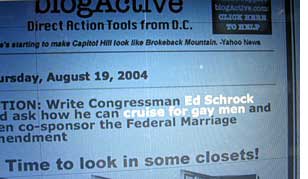 Several
of the film's talking heads report that there are more closeted officials
than most people realize. Lobbyist Tom Sheridan reports that directly underneath
the 2004 election, and all the anti-gay rhetoric, there was a cadre of gay
people. Another remarks that Washington is gayer than San Francisco and
that there are so many gay staffers that "You can't swing a dead
cat without hitting [one.]" Several
of the film's talking heads report that there are more closeted officials
than most people realize. Lobbyist Tom Sheridan reports that directly underneath
the 2004 election, and all the anti-gay rhetoric, there was a cadre of gay
people. Another remarks that Washington is gayer than San Francisco and
that there are so many gay staffers that "You can't swing a dead
cat without hitting [one.]" |
|
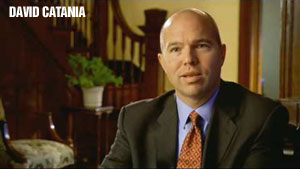 Rodger
McFarlane, former Executive Director of Gay Men's Health Crisis, is quite
adamant when he insists that the closet kills. "Before AIDS, we were concerned
with privacy. After AIDS, that was collusion with genocide," he explains,
referring to officials who failed their responsibility to respond to the
health crisis because they were too busy hiding in the closet. McFarlane
cites a prominent politician "dancing at The Flamingo on the weekends and
propping up the most right wing homophobes by day." Outrage
argues that these individuals should be exposed before they can do any more
harm. Rodger
McFarlane, former Executive Director of Gay Men's Health Crisis, is quite
adamant when he insists that the closet kills. "Before AIDS, we were concerned
with privacy. After AIDS, that was collusion with genocide," he explains,
referring to officials who failed their responsibility to respond to the
health crisis because they were too busy hiding in the closet. McFarlane
cites a prominent politician "dancing at The Flamingo on the weekends and
propping up the most right wing homophobes by day." Outrage
argues that these individuals should be exposed before they can do any more
harm. |
|
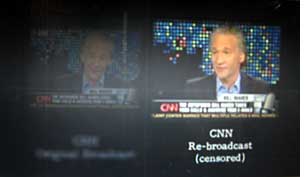 An
early title card states, perhaps a bit sensationally, that "there exists
a brilliantly orchestrated conspiracy to keep gay and lesbian politicians
as closeted as possible. This conspiracy is so powerful the media will not
cover it." The film actually shows a concrete example of this when former
Politically Incorrect host Bill Maher outs Bush/Cheney campaign manager,
Ken Mehlman, to Larry King on CNN. The original broadcast, is shown, and
is followed by a re-broadcast that edits out the reference to Mehlman. This,
apparently, is not an isolated incident. Rich Tafel, Former Executive Director
of the Log Cabin Republicans, talks about reporters being gay but, because
they are part of the Washington culture, they stay in the closet and don't
report gay issues. Ironically, when Outrage
was reviewed for NPR, the news organization's editors removed the names
of the officials who were cited in the film, thus unintentionally adding
credence to Outrage's hypothesis
regarding media cowardice and complicity. An
early title card states, perhaps a bit sensationally, that "there exists
a brilliantly orchestrated conspiracy to keep gay and lesbian politicians
as closeted as possible. This conspiracy is so powerful the media will not
cover it." The film actually shows a concrete example of this when former
Politically Incorrect host Bill Maher outs Bush/Cheney campaign manager,
Ken Mehlman, to Larry King on CNN. The original broadcast, is shown, and
is followed by a re-broadcast that edits out the reference to Mehlman. This,
apparently, is not an isolated incident. Rich Tafel, Former Executive Director
of the Log Cabin Republicans, talks about reporters being gay but, because
they are part of the Washington culture, they stay in the closet and don't
report gay issues. Ironically, when Outrage
was reviewed for NPR, the news organization's editors removed the names
of the officials who were cited in the film, thus unintentionally adding
credence to Outrage's hypothesis
regarding media cowardice and complicity. |
|
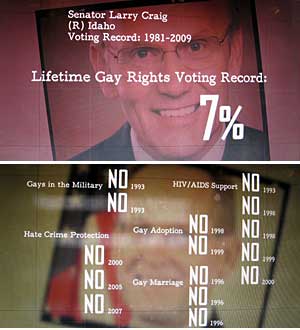 Am
I about to do the same thing? Certainly not. The film begins with the audio
tape from Idaho Senator Larry Craig's police interview when he was arrested
for soliciting sex in an airport men's room. In 1982, we learn, rumors surfaced
that Craig was involved in a sex scandal involving congressmen and teenage
pages. Later we see the Republican Senator's voting record on gay rights
and he earned a whopping 7%. Other politicians exposed in
Outrage include Rep. Ed Schrock, (R)
Virginia, whose voice was recorded on an internet chatline seeking hot man
on man action (voting record: 0%); Florida Governor Charlie Crist (R) and
his many beards; Mayor Ed Koch's response - or lack thereof - during the
early years of the AIDS crisis in New York City; and Rep Jim McCrery, (R)
Louisiana, who, according to an old college acquaintance, was a gay atheist
and liberal before becoming a churchgoing right wing Christian Coalition
candidate. We also hear from Jim Kolbe, former US Representative (R) Arizona,
former New Jersey Governor James McGreevey and Tammy Baldwin, US House of
Representatives (D) Wisconsin - three politicians who came out and felt
relieved after finally doing so. Am
I about to do the same thing? Certainly not. The film begins with the audio
tape from Idaho Senator Larry Craig's police interview when he was arrested
for soliciting sex in an airport men's room. In 1982, we learn, rumors surfaced
that Craig was involved in a sex scandal involving congressmen and teenage
pages. Later we see the Republican Senator's voting record on gay rights
and he earned a whopping 7%. Other politicians exposed in
Outrage include Rep. Ed Schrock, (R)
Virginia, whose voice was recorded on an internet chatline seeking hot man
on man action (voting record: 0%); Florida Governor Charlie Crist (R) and
his many beards; Mayor Ed Koch's response - or lack thereof - during the
early years of the AIDS crisis in New York City; and Rep Jim McCrery, (R)
Louisiana, who, according to an old college acquaintance, was a gay atheist
and liberal before becoming a churchgoing right wing Christian Coalition
candidate. We also hear from Jim Kolbe, former US Representative (R) Arizona,
former New Jersey Governor James McGreevey and Tammy Baldwin, US House of
Representatives (D) Wisconsin - three politicians who came out and felt
relieved after finally doing so. |
|
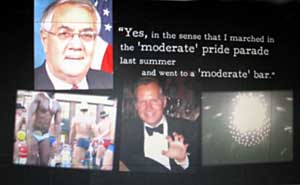 Rogers,
at one point, discusses California Representative David Dreier (R), whom
he calls "a frontline member of a political party hostile to gays." Rogers
received a tip to check out "the boyfriend," Brad Smith, Drier's Chief Of
Staff. He finds records that they traveled together all over the world but
one always arrived one day behind the other - something that would normally
raise a red flag to the press. We hear journalist Michelangelo Signorelle
asking Drier on his Sirius radio program if he's gay and the congressman
evades the question. Other talking heads argue that if Drier was really
straight he would just say so instead of dancing around the question; another
talks about all the euphemisms and codewords for gay that the press used
in describing Drier: confirmed bachelor, conservative bachelor and dapper
bachelor. Drier, a frontrunner for the position of House Majority Leader,
didn't receive the post because others in power considered him "too moderate."
A funny quote from Barney Frank follows: "Yes....in the same sense that
I marched in the 'moderate' Pride Parade last summer and went to a 'moderate
bar.'" Rogers,
at one point, discusses California Representative David Dreier (R), whom
he calls "a frontline member of a political party hostile to gays." Rogers
received a tip to check out "the boyfriend," Brad Smith, Drier's Chief Of
Staff. He finds records that they traveled together all over the world but
one always arrived one day behind the other - something that would normally
raise a red flag to the press. We hear journalist Michelangelo Signorelle
asking Drier on his Sirius radio program if he's gay and the congressman
evades the question. Other talking heads argue that if Drier was really
straight he would just say so instead of dancing around the question; another
talks about all the euphemisms and codewords for gay that the press used
in describing Drier: confirmed bachelor, conservative bachelor and dapper
bachelor. Drier, a frontrunner for the position of House Majority Leader,
didn't receive the post because others in power considered him "too moderate."
A funny quote from Barney Frank follows: "Yes....in the same sense that
I marched in the 'moderate' Pride Parade last summer and went to a 'moderate
bar.'" |
|
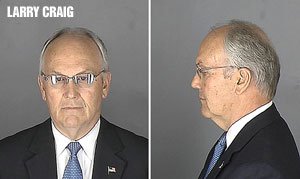 Outing
is a controversial practice that has its detractors even within the gay
community. Signorelle was an early proponent of outing and he has a lot
to say on the subject. David Catania, a gay Washington, DC Councilmember
explains how bigoted politicians have been chasing us for years and praises
Michael Rogers' crusade to out them all. "This fox chases the hounds,"
he says, "and they're scared." Dan Gurley, former National Field Director
of the Republican National Committee, counters that outing is a fundamentally
wrong thing to do because no one knows the journey someone has to take to
accept being gay or lesbian. Even journalist Andrew Sullivan, from The
Atlantic, expresses sympathy for those that are exposed that way. But
Barney Frank is right when he says that people who make the laws should
also be subject to them. Catania goes even further when he says that, for
pols like Craig "who engage in homosexual activity one minute and then try
to write us out of existence the next, there is no punishment harsh enough
for them." Outing
is a controversial practice that has its detractors even within the gay
community. Signorelle was an early proponent of outing and he has a lot
to say on the subject. David Catania, a gay Washington, DC Councilmember
explains how bigoted politicians have been chasing us for years and praises
Michael Rogers' crusade to out them all. "This fox chases the hounds,"
he says, "and they're scared." Dan Gurley, former National Field Director
of the Republican National Committee, counters that outing is a fundamentally
wrong thing to do because no one knows the journey someone has to take to
accept being gay or lesbian. Even journalist Andrew Sullivan, from The
Atlantic, expresses sympathy for those that are exposed that way. But
Barney Frank is right when he says that people who make the laws should
also be subject to them. Catania goes even further when he says that, for
pols like Craig "who engage in homosexual activity one minute and then try
to write us out of existence the next, there is no punishment harsh enough
for them." |
|
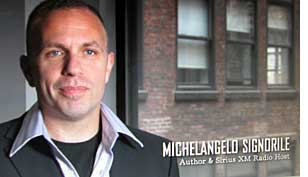 Whatever
your views on outing, take the example of Dan Gurney who was threatened
with outing for his role in the 2004 Presidential campaign - which went
out of its way to demonize the gay community and misinform the general public
about gay marriage. Rogers outed Gurney and then later discovered that Gurley
joined the board of Equality North Carolina. "This is why I started
my blog," Rogers proudly tells the audience, because Gurney is now using
his considerable skills for good rather than evil. Whatever
your views on outing, take the example of Dan Gurney who was threatened
with outing for his role in the 2004 Presidential campaign - which went
out of its way to demonize the gay community and misinform the general public
about gay marriage. Rogers outed Gurney and then later discovered that Gurley
joined the board of Equality North Carolina. "This is why I started
my blog," Rogers proudly tells the audience, because Gurney is now using
his considerable skills for good rather than evil. |
|
 Outrage
is, ultimately, less concerned with the politics of outing and more about
how the hypocrisy of these public figures harms the gay community. This
hypocrisy is a longtime tradition. The example of lawyer Roy
Cohn is pointed out by McFarlane and by playwright Tony
Kushner. Cohn was Senator McCarthy's right hand man during the communist
witch hunts in the 1950s (their other favorite targets were homosexuals
or "perverts"). The torturous ways in which such closeted gay men will rationalize
the ways in which they lie to themselves about their true identity is brilliantly
illustrated with a clip from the HBO film of Kusher's Angels
in America. Al Pacino, as Cohn, explains to his doctor that he is
not a homosexual, he simply "fucks around with guys." To Cohn, a
homosexual is someone who cannot get a "pissant anti-discrimination bill"
passed because they are nobodies and, unlike Cohn, have "zero clout." Outrage
is, ultimately, less concerned with the politics of outing and more about
how the hypocrisy of these public figures harms the gay community. This
hypocrisy is a longtime tradition. The example of lawyer Roy
Cohn is pointed out by McFarlane and by playwright Tony
Kushner. Cohn was Senator McCarthy's right hand man during the communist
witch hunts in the 1950s (their other favorite targets were homosexuals
or "perverts"). The torturous ways in which such closeted gay men will rationalize
the ways in which they lie to themselves about their true identity is brilliantly
illustrated with a clip from the HBO film of Kusher's Angels
in America. Al Pacino, as Cohn, explains to his doctor that he is
not a homosexual, he simply "fucks around with guys." To Cohn, a
homosexual is someone who cannot get a "pissant anti-discrimination bill"
passed because they are nobodies and, unlike Cohn, have "zero clout." |
|
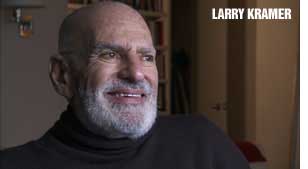 Kevin
Naff, Editor of The Washington Blade, remarks that being in the closet
makes people do "crazy things" - like a Senator reduced to finding sex in
a restroom. Tom Sheridan calls being a closeted politician "dangerous" and
that "it deeply convolutes your perspective of what's right and wrong. It
makes you less genuine." If our leaders aren't true to themselves, how can
they possibly be true to us? Rich Tafel says that once you're out of the
closet, your delusional thinking falls by the wayside, Kevin
Naff, Editor of The Washington Blade, remarks that being in the closet
makes people do "crazy things" - like a Senator reduced to finding sex in
a restroom. Tom Sheridan calls being a closeted politician "dangerous" and
that "it deeply convolutes your perspective of what's right and wrong. It
makes you less genuine." If our leaders aren't true to themselves, how can
they possibly be true to us? Rich Tafel says that once you're out of the
closet, your delusional thinking falls by the wayside, |
|
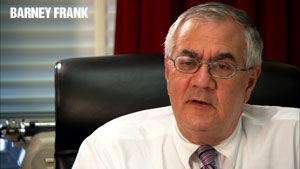 The
results of such self-hatred and subsequent inaction on gay rights is really
hammered home during the segment that examines President Bush's call for
an amendment to the Constitution to ban gay marriage. Elizabeth Birch, former
executive director of The Human Rights Commission, states that the galvanizing
issue of gay marriage was a "gift" to conservatives. Kevin Naff calls it
"a surreal experience" to watch the State of the Union address and hear
the President of the United States attack you and demonize you while the
whole world is watching. Gurley says that it was "a gut check for him and
all gay Republicans." Neil Guiliano, former mayor of Tempe, states that
most attacks against gay people are the result of some public proclamation
and by leaders who spew hatred of gay and lesbians. A populace that doesn't
know any better just follows their lead. This is followed by a montage of
hate crime newscasts and ends with Bush calling on Congress to pass the
abominable amendment. The
results of such self-hatred and subsequent inaction on gay rights is really
hammered home during the segment that examines President Bush's call for
an amendment to the Constitution to ban gay marriage. Elizabeth Birch, former
executive director of The Human Rights Commission, states that the galvanizing
issue of gay marriage was a "gift" to conservatives. Kevin Naff calls it
"a surreal experience" to watch the State of the Union address and hear
the President of the United States attack you and demonize you while the
whole world is watching. Gurley says that it was "a gut check for him and
all gay Republicans." Neil Guiliano, former mayor of Tempe, states that
most attacks against gay people are the result of some public proclamation
and by leaders who spew hatred of gay and lesbians. A populace that doesn't
know any better just follows their lead. This is followed by a montage of
hate crime newscasts and ends with Bush calling on Congress to pass the
abominable amendment. |
|
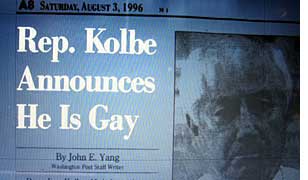 Outrage
is a serious documentary but, like Michael Moore, Kirby Dick also knows
when to inject some humor. How can you not laugh at the hypocrisy when you
see Senator Craig on TV calling then President Bill Clinton a "bad, naughty
boy," or Ed Koch in a top hat singing "Lullaby of Broadway?" There is a
deliciously comic scene where Rogers, on route to Fox News to appear on
Sean Hannity's show, practices with his partner in the limo to make sure
he is prepared for anything the conservative pundit throws his way. The
best howler is a Fox News clip in which the allegedly closeted Shepard Smith
talks about Jennifer Lopez returning to her hometown and uses the term "blow
job" instead of "block party" after uttering the phrase, "curb job." There
are also a number of visual puns, including several phallic shots of the
Washington monument, as well as a liberal use of irony in the way the smiling
head shots of the offending politicians appear as ghostly images behind
their appalling voting records. Outrage
is a serious documentary but, like Michael Moore, Kirby Dick also knows
when to inject some humor. How can you not laugh at the hypocrisy when you
see Senator Craig on TV calling then President Bill Clinton a "bad, naughty
boy," or Ed Koch in a top hat singing "Lullaby of Broadway?" There is a
deliciously comic scene where Rogers, on route to Fox News to appear on
Sean Hannity's show, practices with his partner in the limo to make sure
he is prepared for anything the conservative pundit throws his way. The
best howler is a Fox News clip in which the allegedly closeted Shepard Smith
talks about Jennifer Lopez returning to her hometown and uses the term "blow
job" instead of "block party" after uttering the phrase, "curb job." There
are also a number of visual puns, including several phallic shots of the
Washington monument, as well as a liberal use of irony in the way the smiling
head shots of the offending politicians appear as ghostly images behind
their appalling voting records. |
|
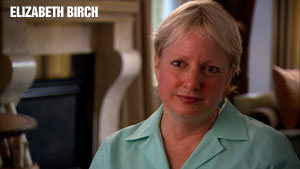 Much
of the film is very sad. Governor McGreevey talks about accepting all the
messages of hate while growing up. He believed that being gay really was
shameful because he was having sex in rest stops. This, he insists,
"becomes unhealthy for the soul." (At this point the film returns to Senator
Craig's police interview so that we can hear him deny being gay again).
Elizabeth Birch talks about closeted politicians "crying in her arms" because
they don't know how to come out. Much
of the film is very sad. Governor McGreevey talks about accepting all the
messages of hate while growing up. He believed that being gay really was
shameful because he was having sex in rest stops. This, he insists,
"becomes unhealthy for the soul." (At this point the film returns to Senator
Craig's police interview so that we can hear him deny being gay again).
Elizabeth Birch talks about closeted politicians "crying in her arms" because
they don't know how to come out. |
|
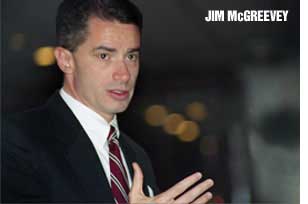 Some
might say that this film preaches to the choir, but director Kirby Dick
and his authoritative talking heads make a persuasive case as they connect
all the dots. A few reviewers claimed that the film's subjects are being
slandered by too much rumor and innuendo. It is possible that some
of the men who have come forward are lying but this could also be true of
the wives who are seen enabling their powerful husbands. Rogers speaks of
two men, who were unknown to each other, who came forward with the same
damning story about Governor Crist. There is no concrete evidence that Crist
is gay but his 1979 marriage lasted only six months, two alleged boy toys
both fled Florida during Crist's gubernatorial campaign, and Crist began
dating during his campaign only to break up with the woman soon afterwards
(when contacted by the filmmakers, she said: "I think I should just keep
my mouth shut. Call me in 10 years and I'll tell you a story." Some
might say that this film preaches to the choir, but director Kirby Dick
and his authoritative talking heads make a persuasive case as they connect
all the dots. A few reviewers claimed that the film's subjects are being
slandered by too much rumor and innuendo. It is possible that some
of the men who have come forward are lying but this could also be true of
the wives who are seen enabling their powerful husbands. Rogers speaks of
two men, who were unknown to each other, who came forward with the same
damning story about Governor Crist. There is no concrete evidence that Crist
is gay but his 1979 marriage lasted only six months, two alleged boy toys
both fled Florida during Crist's gubernatorial campaign, and Crist began
dating during his campaign only to break up with the woman soon afterwards
(when contacted by the filmmakers, she said: "I think I should just keep
my mouth shut. Call me in 10 years and I'll tell you a story." |
|
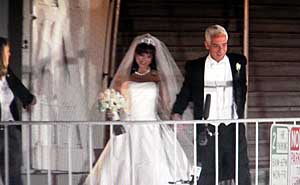 Conservative
pundits have called Outrage a
piece of muckraking. Does the director omit certain details? Yes; for example,
there is no mention of the sex scandal that forced Barney Frank to come
out so as not to taint his "sainthood." There is also no smoking
gun to prove conclusively that Governor Crist is secretly gay. Whether he
is or not, Crist seems especially dangerous because he has appointed two
Florida Supreme Court justices who strongly oppose gay marriage and he continues
to support the ban on gay adoption even after a Florida judge ruled it unconstitutional.
Ironic footage of his recent marriage actually becomes scary when a title
card announces that Crist is one of the top contenders for the Republican
Presidential nomination in 2012. Be afraid, be very afraid. Conservative
pundits have called Outrage a
piece of muckraking. Does the director omit certain details? Yes; for example,
there is no mention of the sex scandal that forced Barney Frank to come
out so as not to taint his "sainthood." There is also no smoking
gun to prove conclusively that Governor Crist is secretly gay. Whether he
is or not, Crist seems especially dangerous because he has appointed two
Florida Supreme Court justices who strongly oppose gay marriage and he continues
to support the ban on gay adoption even after a Florida judge ruled it unconstitutional.
Ironic footage of his recent marriage actually becomes scary when a title
card announces that Crist is one of the top contenders for the Republican
Presidential nomination in 2012. Be afraid, be very afraid. |
|
|
Oh, and by the way, the film's director is straight.
More On Kirby
Dick: |